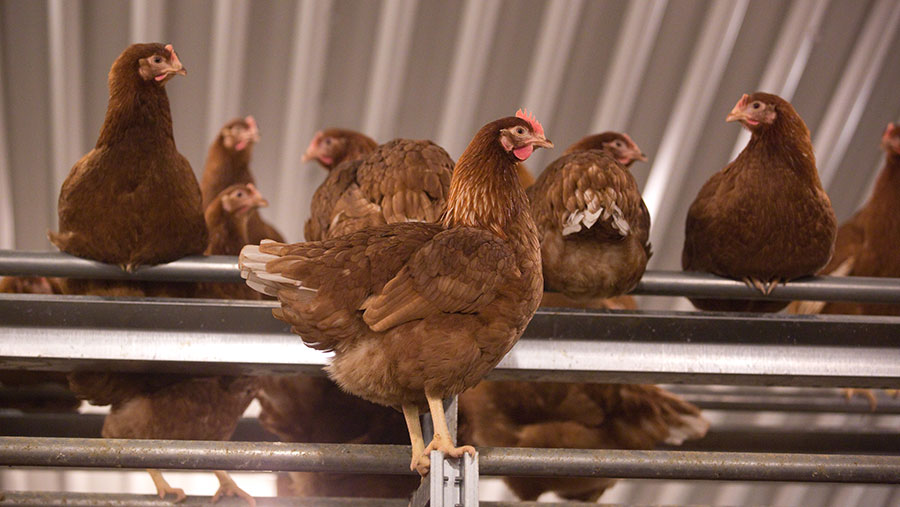Avian flu: Poultry housing order imposed in North Yorkshire
 © Tim Scrivener
© Tim Scrivener A poultry housing order has been introduced across parts of North Yorkshire following several new confirmed and suspected cases of avian influenza in flocks across Great Britain.
Defra introduced the temporary housing order for flocks in the North Yorkshire districts of Harrogate, Hambleton and Richmondshire from 8pm on Sunday 21 November.
The move follows confirmation of a case of highly pathogenic avian influenza (HPAI) H5N1 – which is highly contagious and can kill flocks – at a premises near Thirsk, Hambleton.
See also: Q&A: Guidance on avian flu with England’s chief vet
The government restrictions (PDF) require all bird keepers in these three areas of North Yorkshire to keep their birds indoors and follow strict biosecurity measures to limit the spread of the disease.
Defra chief vet Christine Middlemiss is urging local bird keepers to act immediately in response to the measures. This includes taking steps to safeguard animal welfare, consult vets and erect additional housing where necessary.
“Whether you keep just a few birds or thousands, from 8pm Sunday onwards you will be legally required to keep your birds indoors,” said Ms Middlemiss.
“We have not taken this decision lightly, but it is the best way to protect your birds from this highly infectious disease.”
The main signs of highly pathogenic avian influenza in poultry
The main clinical signs of the H5N1 strain include:
- Swollen head
- Blue discolouration of the head, comb, wattles (cyanosis)
- Loss of appetite
- Difficulty breathing (gaping beak, coughing, sneezing, rales, gurgling)
- Diarrhoea
- Fewer eggs laid or eggs with watery whites
- Increased mortality
Clinical signs can vary between species of birds. Chickens and turkeys can be severely affected, with high mortality rates, while other species (such as ducks and geese) may show minimal signs.
Source: Department of Agriculture, Food and the Marine, Irish government
Norfolk case
An outbreak of the H5N1 strain of avian flu, commonly called bird flu, has also been confirmed at a premises near Wells-nest-the-sea, in north Norfolk.
Temporary control zones of 3km and 10km have been put in place around the affected site.
Three further new cases of the H5N1 strain have also been confirmed at a premises near Mouldsworth, Cheshire, at a holding near Silecroft, Copeland, Cumbria and, finally, in birds near North Fambridge, Maldon, Essex.
NFU chief poultry adviser Aimee Mahony said: “I would urge all of our poultry members to continue to practise enhanced biosecurity at all times and to be vigilant for any signs of disease in their flock.
“I would also ask members of the public who keep birds such as chickens, geese and ducks to follow Defra’s biosecurity advice. All bird keepers have an important part to play in reducing the risk of avian influenza – not only to their own birds, but also to the commercial poultry sector.”
Overall, Defra has confirmed 13 cases of avian flu in England and one in Wales. In Scotland, a case of H5N1 avian flu has been confirmed at a poultry farm in Angus.
HPAI H5N1 has also been confirmed in more than 100 wild birds across Great Britain.
Irish case
Meanwhile, the same strain of avian flu has been detected in a commercial housed turkey flock in County Monaghan, Ireland, the Department of Agriculture, Food and the Marine has confirmed.
An avian influenza prevention zone (APIZ) is now in place across Great Britain and Northern Ireland. The order means bird keepers must follow strict biosecurity measures to help protect their flocks.
The risk to the public from the H5N1 strain of avian flu is “very low” and it does not affect the consumption of eggs and poultry products, according to the Food Standards Agency.
Avian flu has been spreading across Europe this autumn, with cases identified in commercial poultry flocks in Germany, the Netherlands, Italy, Poland, Denmark, Hungary, Estonia, the Czech Republic, Norway, Bulgaria and Belgium.
Wild birds migrating to the UK from mainland Europe are believed to be responsible for spreading the disease here among captive birds and poultry flocks.
Avian flu is a notifiable animal disease and poultry and captive bird keepers should report suspicion of disease to Defra in England on 03000 200 301, Wales on 0300 3038268 and in Scotland through the Local Field Service Office. In Northern Ireland, contact Daera on 0300 200 7840.
